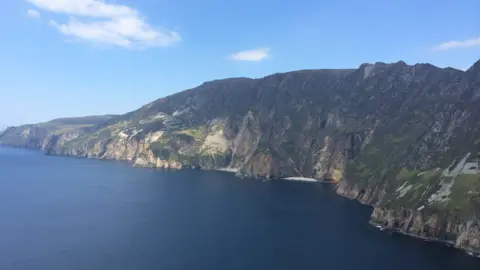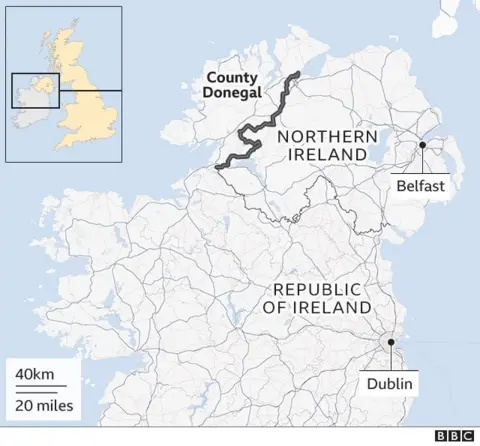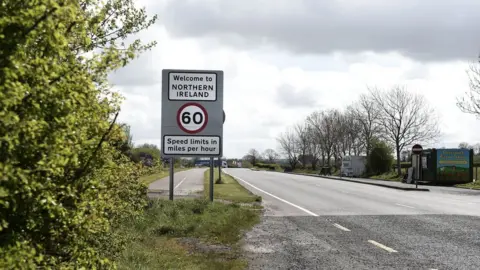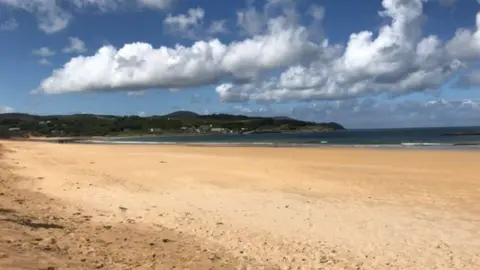Coronavirus: 'Avoid all but necessary travel across NI-Donegal border'
 BBC NEWS
BBC NEWSThe chief medical officers from NI and the Republic of Ireland have advised against all but necessary travel across the NI-Donegal border.
Dr Michael McBride and Dr Ronan Glynn have also asked employers to try and facilitate employees working from home.
In a joint statement, they appealed to the public across the island to continue following public health advice.
The move follows a rise in case numbers in Donegal and NI's north west.
Tighter Covid-19 restrictions are set to come into force in County Donegal - the level three restrictions will be imposed at midnight and will be in place until 16 October.
First Minister Arlene Foster has said people intending to travel for a weekend break or to their holiday homes in the county before the restrictions kick in should not make the journey.
"People should use their common sense," she said.
"What we're trying to do at the moment is to break the transmission of the virus, and the way to do that is to follow the regulations and to follow the advice."
Other border areas
Garda checkpoints are to be set up throughout the county as part of an operation "focusing on supporting public compliance" with the health measures.
Cross-border checkpoints in cooperation with the PSNI will also be mounted in specific locations.
Acting chief medical officer for the Republic of Ireland Dr Ronan Glynn and chief medical officer for Northern Ireland Dr Michael McBride said they realised their travel advice would "not be welcome news for those living in border areas".
The chief medical officers also noted specific concern about the significant proportion of cases in young people in both Donegal and Derry.
They appealed to teenagers and those in their 20s and 30s to reduce their social contacts.
Both Dr McBride and Dr Glynn said there would be "close collaboration" between the relevant authorities in the coming days "to address the concerning trend in case numbers on both sides of the border, not alone in Donegal and Derry, but also in other areas along the border."


Donegal now has the highest rate of Covid-19 in the Irish Republic.
Dr Martin Coyne, a GP in Lifford, told BBC Radio Foyle his practice had experienced a three-fold rise in cases over recent weeks.
"Between the start of the Covid crisis and 10 September in Lifford, we had 17 positive Covid cases. Since then, until yesterday, we've had another 54," he said.
The majority of new cases are people aged under 35, he added.
Rising cases
On Friday, the Department of Health's daily dashboard reported no new coronavirus-related deaths and 273 more positive cases. The death toll in NI remains at 577.
The 273 new cases is the highest number of people testing positive under the current testing system.
The dashboard also shows 46 people are in hospital with Covid-19, with five patients in intensive care units.
Donegal shares a border with the Derry and Strabane Council area in Northern Ireland, which has NI's fastest-rising Covid-19 caseload.
The seven-day incidence of the disease in the council area has risen to 160.6 confirmed cases per 100,000 people.
A mobile testing centre will be in operation from Saturday at the Melvin Leisure Centre car park in Strabane, and tests can be booked here.
 Getty Images
Getty ImagesIn the Republic of Ireland, 326 new cases were reported in the past 24 hours, including 22 new cases in Donegal. There have been no further deaths.
Donegal has overtaken Dublin as the area with the highest rate of cases, with the county now at 148.2 cases per 100,000 people.
The Irish death toll from Covid-19 remains at 1,797 with 34,315 confirmed cases.
Sinn Féin TD Padraig MacLochlainn said people should not travel to Donegal "for holiday or entertainment purposes".
He said complacency on the part of a "small number of our people" may have sparked the resurgence of the virus in the north west.
Cross-border repercussions
The new restrictions on the Irish county will affect businesses that rely on cross-border tourism and trade.
President of Londonderry Chamber of Commerce Redmond McFadden said that was the "price we have to pay".
"We have to get on top of this. We cannot be complacent. People must do the right thing, it is that simple," he said.
Foyle MP Colum Eastwood said the restrictions in Donegal would be difficult for people in Derry and Strabane.
Donegal's tighter restrictions mean people are again being asked to work from home where possible and only to make essential journeys on public transport.
Visitors to private homes and gardens should be limited to a maximum of six people from one other household.
There are to be no organised indoor gatherings and outdoor gatherings are to be up to a maximum of 15 people.
 BBC News
BBC NewsPeter McLaughlin is a former mayor of Buncrana and owner of a pub in the town.
He said it was difficult to understand what was behind the recent surge in the region, but people in Donegal would support the new measures.
"There is a certain level of fatigue, but people are very aware of what they have to do," he said.
One of the north west's biggest employers has closed part of its factory after five staff tested positive for Covid-19.
A further 21 employees are currently self-isolating "as a precautionary measure", Strabane-based sportswear firm O'Neills said.
Meanwhile, the Irish government is extending restrictions for universities and further education colleges.
For the next two weeks face-to-face teaching will be limited to practical classes only where online teaching is not possible.
